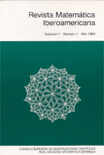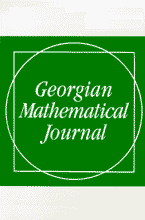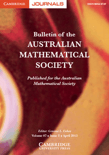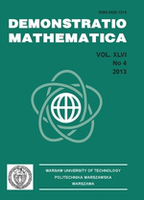
Rendiconti del Circolo Matematico di Palermo
Scope & Guideline
Navigating the Evolution of Mathematical Ideas.
Introduction
Aims and Scopes
- Algebra and Number Theory:
The journal publishes research on various aspects of algebra, including group theory, ring theory, and number theory. This includes studies on ideals, derivations, and algebraic structures. - Analysis and Differential Equations:
A significant focus is on real and complex analysis, as well as differential equations, including both ordinary and partial differential equations. This encompasses topics like stability, controllability, and boundary value problems. - Functional Analysis and Operator Theory:
Research on functional analysis, operator theory, and related fields is prominently featured. This includes studies on linear operators, spectral theory, and fixed point theorems. - Geometry and Topology:
The journal includes contributions to geometric analysis and topology, covering topics such as manifolds, curvature, and geometric structures. - Fractional Calculus and Nonlocal Problems:
There is a growing interest in fractional calculus and nonlocal problems, reflecting the journal's commitment to contemporary mathematical issues and methodologies. - Numerical Analysis and Approximation Theory:
The journal also encompasses numerical methods, approximation theory, and their applications in solving mathematical models.
Trending and Emerging
- Fractional Calculus:
The increasing number of publications on fractional calculus indicates a rising interest in non-integer order derivatives and their applications in various fields such as physics and engineering. - Mathematical Modeling and Applications:
There is a notable trend towards mathematical modeling, particularly in relation to real-world phenomena such as population dynamics, epidemiology, and complex systems, showcasing the journal's relevance to applied mathematics. - Nonlinear Analysis and Partial Differential Equations:
Recent years have seen an upsurge in research focusing on nonlinear analysis and the study of partial differential equations, reflecting a broader trend in addressing complex systems with nonlinear dynamics. - Computational Mathematics:
Research integrating computational techniques and numerical methods into theoretical studies is on the rise, indicating a blend of theoretical and practical approaches in contemporary mathematics. - Operator Theory and Functional Analysis:
There is a growing body of work in operator theory and functional analysis, emphasizing the significance of these areas in understanding mathematical structures and their applications.
Declining or Waning
- Classical Geometry:
Research papers focusing on classical geometry, including traditional studies of geometric constructions and properties, have seen a decline in favor of more modern and applied geometrical studies. - Elementary Number Theory:
There has been a noticeable decrease in papers centered around elementary number theory, as researchers tend to explore more complex and abstract algebraic structures. - Discrete Mathematics:
Publications in discrete mathematics, including combinatorial studies and graph theory, have diminished, possibly due to a shift towards continuous mathematical models and applications. - Real Analysis without Applications:
Papers focused solely on theoretical aspects of real analysis without practical applications have become less common, as there is a trend towards integrating theory with application.
Similar Journals

Analele Stiintifice ale Universitatii Ovidius Constanta-Seria Matematica
Connecting Ideas and Insights in the World of MathematicsAnalele Stiintifice ale Universitatii Ovidius Constanta-Seria Matematica is a prominent open-access journal established by OVIDIUS UNIV PRESS in Romania, dedicated to advancing the fields of mathematics, specifically in Analysis and Applied Mathematics. Since its inception, the journal has emphasized the dissemination of high-quality research, making it accessible to a global audience. With an ISSN of 1224-1784 and E-ISSN 1844-0835, it has positioned itself within the academic community, achieving a respectable Q3 ranking in both analysis and applied mathematics in 2023, reflecting its commitment to rigorous scholarship. The journal spans a considerable publication window from 2009 to 2024, catering to the ongoing developments in mathematical sciences and their applications. Researchers, professionals, and students alike will find valuable insights and contributions that enrich their understanding and foster collaboration within the mathematical community. The journal's headquarters is based at the Faculty of Mathematics & Computer Science, Bulevardul Mamaia 124, Constanta, Romania.

Pure and Applied Mathematics Quarterly
Pioneering Insights in Pure and Applied MathematicsPure and Applied Mathematics Quarterly is a prestigious journal published by INT PRESS BOSTON, INC, focusing on the diverse and evolving field of mathematics. Since its inception in 2007, this journal has grown significantly, currently holding a Q1 ranking in the Mathematics (Miscellaneous) category for 2023, positioning it among the leading publications in the discipline. With a commitment to publishing high-quality research, Pure and Applied Mathematics Quarterly fosters innovation and dialogue within the mathematical community by providing a platform for theoretical advancements and practical applications. The journal remains accessible to researchers and professionals through its ISSN 1558-8599 and E-ISSN 1558-8602, although it does not currently offer open access. As a vital resource for mathematicians, educators, and students, this journal endeavors to expand the frontiers of mathematical knowledge and contribute to the academic dialogue surrounding this fundamental science.

REVISTA MATEMATICA IBEROAMERICANA
Advancing mathematics through innovative research.REVISTA MATEMATICA IBEROAMERICANA, published by the EUROPEAN MATHEMATICAL SOCIETY, is a leading open-access journal dedicated to advancing the field of mathematics. Since its inception in 1996, the journal has provided a platform for high-quality research up to 2024, achieving a prestigious Q1 ranking in the miscellaneous mathematics category and placing it within the top 77th percentile of the Scopus rankings. Based in Spain, this journal fosters a vibrant academic community by disseminating innovative research, theoretical insights, and applications within the broad scope of mathematics. With its commitment to open access established in 2022, REVISTA MATEMATICA IBEROAMERICANA ensures that groundbreaking research is accessible to scholars, practitioners, and students worldwide, emphasizing the importance of collaboration and knowledge sharing in the mathematical sciences. The journal is a vital resource for anyone invested in the evolution of mathematics, providing a rich array of articles that contribute to both the theoretical and applied landscapes of the discipline.

Analysis & PDE
Unveiling New Dimensions in Analysis and Partial Differential Equations.Analysis & PDE is a premier journal dedicated to advancing the fields of analysis and partial differential equations, published by Mathematical Science Publications. With its ISSN 1948-206X, this journal has established itself as a critical platform for the dissemination of high-quality research since its inception in 2008. An indicator of its scholarly impact, it holds a prestigious Q1 ranking in the 2023 categories of Analysis, Applied Mathematics, and Numerical Analysis. The journal's esteemed standing is further underscored by its impressive Scopus rankings, including Rank #24 in Mathematics Analysis, placing it in the 87th percentile of its category. Aimed at researchers, professionals, and advanced students, Analysis & PDE provides a vital forum for innovative studies that push the boundaries of mathematics while fostering a deeper understanding of analytical methods and their applications across various real-world challenges. With no open access restrictions, it remains an accessible resource for the global research community. For more information, please reach out to the editorial office at the Department of Mathematics, University of California, Berkeley.

TRANSACTIONS OF THE AMERICAN MATHEMATICAL SOCIETY
Unveiling Insights in the Mathematical RealmTRANSACTIONS OF THE AMERICAN MATHEMATICAL SOCIETY, published by the American Mathematical Society, is a premier journal in the field of mathematics that has been contributing to the advancement of mathematical knowledge since 1900. With an ISSN of 0002-9947 and an E-ISSN of 1088-6850, this journal holds a prestigious position in the academic landscape, evidenced by its Q1 rankings in both Applied Mathematics and Miscellaneous Mathematics categories as of 2023. With a Scopus ranking of #97 in General Mathematics and a percentile standing of 75th, the journal is recognized for its rigorous peer-review process and the quality of the research it publishes. Though it does not currently offer open access options, it essentially serves as a vital resource for researchers, professionals, and students seeking critical insights and developments in mathematical theory and applications. The Transactions aim to publish high-quality research articles that foster the exchange and dissemination of ideas, supporting the growth of both theoretical and applied mathematics within the global scholarly community.

Georgian Mathematical Journal
Championing excellence in mathematical exploration.Georgian Mathematical Journal, published by Walter de Gruyter GmbH, is a prestigious academic journal dedicated to the field of mathematics, particularly in its multifaceted applications and theoretical explorations. With an ISSN of 1072-947X and an E-ISSN of 1572-9176, this journal is indexed within notable databases and holds a strong position as evidenced by its Q2 ranking in the Mathematics (miscellaneous) category as of 2023 and a ranking of #140 out of 399 in the general mathematics Scopus category, placing it in the 65th percentile for research visibility. Since its inception in 1994, the journal has continued to evolve, aiming to foster innovative research and scholarly communication among mathematicians worldwide. Although it does not offer Open Access, the journal’s commitment to quality and rigor ensures that published works are of high relevance, appealing to researchers, educators, and students who are dedicated to advancing mathematical knowledge across diverse domains.

BULLETIN OF THE AUSTRALIAN MATHEMATICAL SOCIETY
Illuminating Mathematical Innovations for GenerationsBULLETIN OF THE AUSTRALIAN MATHEMATICAL SOCIETY is an esteemed journal dedicated to advancing the field of mathematics, published by Cambridge University Press. Since its inception in 1969, this periodical has fostered scholarly communication and showcased pivotal research in various domains of mathematics, now projected to continue until 2024. With an impact factor that places it in the Q2 category of miscellaneous mathematics research, it holds a notable position among its peers, ranking 215th out of 399 in the Scopus database. Though it does not currently offer open access options, the journal remains a vital resource for researchers, professionals, and students seeking to deepen their understanding of mathematical advancements. The Bulletin serves as a crucial platform for disseminating original research, comprehensive reviews, and insightful perspectives that navigate the complexities of mathematics today, ensuring the community is well-informed and engaged.

Demonstratio Mathematica
Advancing Mathematical Knowledge for AllDemonstratio Mathematica, published by DE GRUYTER POLAND SP Z O O, is an esteemed open-access journal in the field of mathematics, with an ISSN of 0420-1213 and E-ISSN 2391-4661. Established in 1996 and providing open access since 2009, it has become a vital platform for disseminating innovative research and advancements in various areas of mathematics. With a commendable Scopus ranking of 85/399 in General Mathematics and a 2023 Category Quartile of Q2, it stands at the forefront of the mathematical community, demonstrating a significant impact within the top 78th percentile. The journal aims to foster a deeper understanding and appreciation of mathematical concepts and their applications, catering to both seasoned researchers and emerging scholars. Located in Warsaw, Poland, Demonstratio Mathematica not only enriches the academic discourse but also strengthens collaborative efforts within the international mathematics community, making it an essential resource for those seeking to expand their knowledge and research output.

PUBLICATIONES MATHEMATICAE DEBRECEN
Fostering Innovation in Mathematical SciencesPublicationes Mathematicae Debrecen is a renowned international journal published by the University of Debrecen, Institute of Mathematics, situated in Hungary. This journal, with both ISSN 0033-3883 and E-ISSN 2064-2849, has established itself in the field of mathematics since its inception, with coverage extending from 1997 to 2024. Recognized for its rigorous academic standards, it currently holds a Q3 ranking in the mathematics (miscellaneous) category for 2023 and ranks at the 42nd percentile among general mathematics journals in Scopus. Publicationes Mathematicae Debrecen aims to disseminate high-quality research across various areas of mathematics, contributing to the advancement of knowledge and practice in this dynamic field. Although it is not an open-access journal, its readers can access a wealth of scholarly work that addresses both theoretical and applied mathematical issues, making it an invaluable resource for researchers, professionals, and students alike.

Bulletin of the Iranian Mathematical Society
Fostering innovation in mathematics through scholarly exchange.The Bulletin of the Iranian Mathematical Society, published by SPRINGER SINGAPORE PTE LTD, is a distinguished journal dedicated to advancing the field of mathematics. With an ISSN of 1017-060X and E-ISSN 1735-8515, this journal has established a valuable platform for researchers and scholars to disseminate their findings from 2008 to 2024. The journal is categorized in the Q2 tier of Mathematics (miscellaneous) for 2023, showcasing its importance and relevance in the mathematical community, ranked #169 out of 399 in General Mathematics with a 57th percentile standing in Scopus. While currently operating under a subscription model, it remains an essential resource for professionals and students seeking cutting-edge research and developments in various domains of mathematics. The Bulletin aims to bridge theoretical research and practical application, thereby enriching both academia and industry.